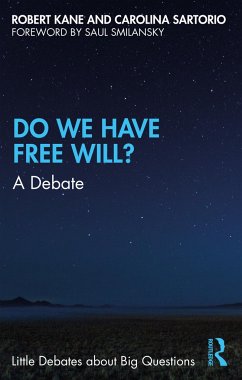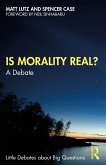In this little but profound volume, Robert Kane and Carolina Sartorio debate a perennial question: Do We Have Free Will?
Kane introduces and defends libertarianism about free will: free will is incompatible with determinism; we are free; we are not determined. Sartorio introduces and defends compatibilism about free will: free will is compatible with determinism; we can be free even while our actions are determined through and through. Simplifying tricky terminology and complicated concepts for readers new to the debate, the authors also cover the latest developments on a controversial topic that gets us entangled in questions about blameworthiness and responsibility, coercion and control, and much more.
Each author first presents their own side, and then they interact through two rounds of objections and replies. Pedagogical features include standard form arguments, section summaries, bolded key terms and principles, a glossary, and annotated reading lists. Short, lively and accessible, the debate showcases diverse and cutting-edge work on free will. As per Saul Smilansky's foreword, Kane and Sartorio, "present the readers with two things at once: an introduction to the traditional free will problem; and a demonstration of what a great yet very much alive and relevant philosophical problem is like."
Key Features:
Covers major concepts, views and arguments about free will in an engaging formatAccessible style and pedagogical features for students and general readersCutting-edge contributions by preeminent scholars on free will.
Kane introduces and defends libertarianism about free will: free will is incompatible with determinism; we are free; we are not determined. Sartorio introduces and defends compatibilism about free will: free will is compatible with determinism; we can be free even while our actions are determined through and through. Simplifying tricky terminology and complicated concepts for readers new to the debate, the authors also cover the latest developments on a controversial topic that gets us entangled in questions about blameworthiness and responsibility, coercion and control, and much more.
Each author first presents their own side, and then they interact through two rounds of objections and replies. Pedagogical features include standard form arguments, section summaries, bolded key terms and principles, a glossary, and annotated reading lists. Short, lively and accessible, the debate showcases diverse and cutting-edge work on free will. As per Saul Smilansky's foreword, Kane and Sartorio, "present the readers with two things at once: an introduction to the traditional free will problem; and a demonstration of what a great yet very much alive and relevant philosophical problem is like."
Key Features:
Covers major concepts, views and arguments about free will in an engaging formatAccessible style and pedagogical features for students and general readersCutting-edge contributions by preeminent scholars on free will.
'This superb introduction to free will is highly accessible without paying the price in over-simplification. The debate format does a wonderful job of highlighting the pros and cons of Kane's and Sartorio's competing positions on free will. Ideal for an undergraduate course on free will.' - Alfred R. Mele, Florida State University, USA
'This is an outstanding book by two of the very top philosophers working on free will and moral responsibility. They are each perfect representatives of the best recent developments of two important positions: libertarianism and compatibilism. The book is clear and lively, and it is a perfect text for an undergraduate course on these topics. Highly recommended!' - John Martin Fischer, University of California, Riverside, USA
'This is an outstanding book by two of the very top philosophers working on free will and moral responsibility. They are each perfect representatives of the best recent developments of two important positions: libertarianism and compatibilism. The book is clear and lively, and it is a perfect text for an undergraduate course on these topics. Highly recommended!' - John Martin Fischer, University of California, Riverside, USA
'This superb introduction to free will is highly accessible without paying the price in over-simplification. The debate format does a wonderful job of highlighting the pros and cons of Kane's and Sartorio's competing positions on free will. Ideal for an undergraduate course on free will.' - Alfred R. Mele, Florida State University, USA
'This is an outstanding book by two of the very top philosophers working on free will and moral responsibility. They are each perfect representatives of the best recent developments of two important positions: libertarianism and compatibilism. The book is clear and lively, and it is a perfect text for an undergraduate course on these topics. Highly recommended!' - John Martin Fischer, University of California, Riverside, USA
'This is an outstanding book by two of the very top philosophers working on free will and moral responsibility. They are each perfect representatives of the best recent developments of two important positions: libertarianism and compatibilism. The book is clear and lively, and it is a perfect text for an undergraduate course on these topics. Highly recommended!' - John Martin Fischer, University of California, Riverside, USA








